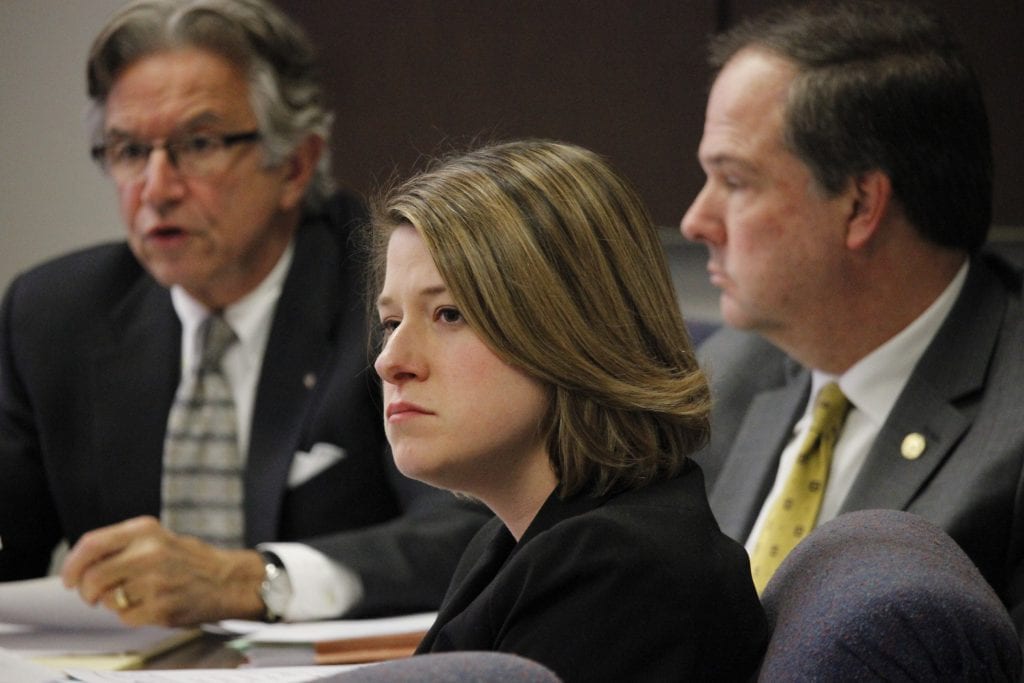After months of debate about the Mehlville School District calendar, the Board of Education’s approval of a longer calendar for next year came and went without protest, at a meeting where teachers and board members were distracted by their first public glimpse of proposed budget cuts.
The Calendar Committee’s official recommendation of a school calendar with two more days — as required by a recently updated district policy — was approved unanimously without discussion during the school board’s March 11 meeting in the consent agenda, where multiple items of usually minor business are approved by voice vote.
The 2015-2016 calendar will be part of salary negotiations this spring between the district and the Mehlville National Education Association, or MNEA, a compromise brokered by Superintendent Norm Ridder to break the public stalemate between the teachers’ union and some board members on what exactly they agreed to in negotiations last year.
Although the board approved a calendar with 176 days, the decision is not necessarily binding. Negotiating teams could decide whether to take away days to go back to the current 174, add days for no salary increases or add days in exchange for raises.
MNEA President Dawn Mehacek, who teaches at Rogers Elementary, told the Call that teachers were surprised that the board approved the extra days in light of pending budget cuts of $4 million or $8 million.
“It was very shocking to have that calendar passed because how are we going to pay for it?” Mehacek said.
But the district is already paying for the extra days, said board President Ron Fedorchak, who represented the board in negotiations last year along with Secretary Lori Trakas and board member Larry Felton.
A one-year memorandum of understanding, or MOU, dictated 2014-2015 total salary increases of 3.5 percent and, on a separate line, two more days in the 2015-2016 calendar. Since the vote on the MOU, Fedorchak has said publicly that the raises were in exchange for the two days.
Mehlville High School teachers and MNEA negotiators Ernie Perrica and Mike Ghormley agree there was no such exchange.
The Call also talked to former Superintendent Eric Knost, who served on the negotiations team last year. Without having reviewed the MOU in nearly a year, he said he would point to its wording to indicate what the agreement was, a view shared by Felton.
The language of the contract does not specifically outline an exchange, but all the board’s officers — Fedorchak, Trakas and Vice President Venki Palamand — told the Call it was clear to them at the time that the raises were in exchange for days.
The dispute is just one example of why any agreements made in Mehlville during Ridder’s tenure will be clearly spelled out in writing, the superintendent noted.
The night the calendar was approved, Perrica was the only speaker to mention it.
“My passion is Mehlville students, I love working with the community that I grew up in … Some of that pride, though, I have for this community is beginning to take a small hit,” Perrica said. “Last year during MNEA negotiations, we were told the board was going to add days to the calendar and this was not going to be negotiated … As a separate agreement, $350 was added to the base (teacher salary) — it was never mentioned that the $350 was for the two days for the 2015-2016 school year …”
Fedorchak speculated that perhaps the “rank and file” of the MNEA were unhappy when they found out about the deal for more days brokered by their leadership, so now the leaders are speaking out against their own agreement.
“I don’t know why they’re misremembering it as a lie that we didn’t talk about it. You can ask other board members, that was a compromise,” he said. “The reason I put it in there is because they played the same game with (former board President) Mark Stoner about the merit pay system (through an MOU). They ignored it and got the two steps anyway.
“I don’t think they wanted that statement in the MOU, but I insisted that it be part of that. They did get paid for it — they got paid a year in advance with an extra $350 to the base. The daily rate is like $180, so we were a little short when we gave the $350, but we’ll talk about that. If you want to ask for more money, we can talk about more days and more money.”
Initially, MNEA negotiators asked for three times the base increase they received, Fedorchak said. The compromise of starting raises this year for calendar days yet to be added was Felton’s suggestion, Fedorchak and Palamand agreed.
“Larry crafted the compromise that led to additional time in 2015-’16 for more money immediately,” Palamand said.
Felton agreed he proposed the $350 increase, but “that had nothing to do with the two days in the future. My intent when I did that — it had nothing to do with the two days in the calendar. All that really matters in the final analysis is what is written is what happened. I think (focusing on the MOU) detracts from moving forward, but everyone’s entitled to their opinion.”
Trakas said it’s difficult to remember everyone’s exact language or tit-for-tat statements from discussions that took place nearly a year ago, but she believed at the time and still believes the base increase was in exchange for more days, pointing to the fact that the raise adds up to roughly two days’ pay as evidence.
“Why else would they pick that number — $350, when $360 would have been the amount (for two days)?” she said.
“In my experience as a manager when you get appraisals or you took notes of situations, if it wasn’t written down it never happened,” Felton said. “What any of us said in there I don’t think is constructive to get into. I think what’s written is what was agreed.”
When state legislators visited Mehlville for the annual legislative breakfast, Ridder noted in a perfect world the state would provide funding for 210 school days statewide, but as it stands, the state only provides money for the minimum 174 days.
Even after adding two days next year, Mehlville’s school year is below surrounding districts and below the national average of 180 days.
“Is there any data that shows less days are better? We look at Lindbergh and their test scores and their days and their time …,” said board member Samantha Stormer before the August vote to change policy to 176 days. “When you start looking at other schools that are going more days, their test scores reflect that. Instructional time with a teacher, I don’t understand how that’s a downfall to any student achievement and student learning.”
At the time, Ridder noted that districts can get creative with the way time is used rather than just adding more time if any inefficiencies are still in the classroom, but he also said if the district was willing to fund it, adding many days to the calendar could likely increase achievement.
“If this district’s willing to pay for it, hey, 200 days,” he said. “We could put together a heck of a machine for 200 days, but that’s a lot of money.”





















